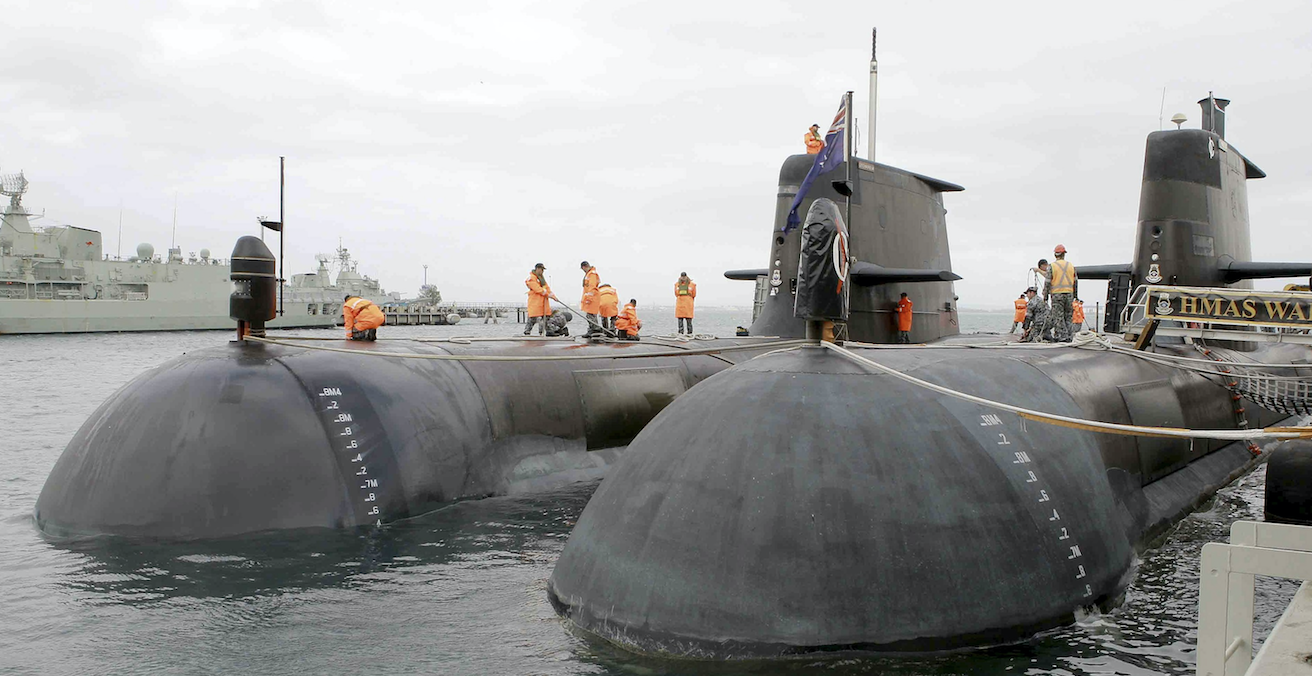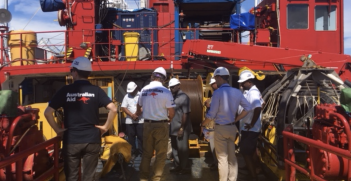The Great Defence Debate We’ve Never Had

The $50 billion Australian-French submarine deal was finalised in February. But with the Australian Government committing to spend increasingly large amounts of taxpayer money on military hardware, it is worth asking why there is so little public debate on the necessity of such expenditure.
The Australian government is about to spend a colossal amount of money on a new generation of weapons systems. No one has the slightest idea quite how much the final figure will actually be. But the government is committed to increasing defence spending to 2 percent of GDP by 2020-21, which means it will potentially spend AUD $1 trillion on the military over the next two decades. All we can be sure of is that, amongst this expenditure, the cost of a new generation of weapons systems will be much higher than we were originally led to believe, and that the weapons themselves will be delivered late and won’t work as promised.
In the particular case of the new submarines, even in the unlikely event they work as promised, they will probably have been rendered redundant by subsequent technological developments and a range of cheap and cheerful generation of drones that nullify their supposed stealthy selling points. Robert Gottliebsen suggested that “the $220 billion-plus French submarine proposal threatens to be the worst financial and defence decision in our history.”
This ought to be a cause for concern under any circumstances, but when the unproven submarines are sure to be late, over-budget and possibly useless, it is striking how little debate there has been about the wisdom of investing so much of our money in – pardon the pun – sub-optimal technology.
One of the principal reasons there is so little scrutiny of defence spending is that anyone who questions the wisdom of making Australia secure is regarded as irresponsible, naïve, or even traitorous. The safety of the nation is, after all, the principal responsibility of any government, right?
Perhaps so. The related, but seldom considered, corollary of this claim though is to ask: protect us from what? There is precious little consideration or public discussion of the precise threats this spending is designed to deter. The general public can be forgiven for finding such debates intimidatingly technical, theoretical and/or stupefyingly boring. Unfortunately, this is another reason defence spending gets a free pass and is subject to shockingly little real oversight. Indeed, so lax is the oversight process that the Defence Department was able to spend $244 million without seeking the mandatory ministerial approval. Which other government departments could get away with that?
Possible defence acquisitions and the supposed strategic logic that underpins them are primarily discussed amongst a remarkably small group of specialists largely based in Canberra. These sensible chaps – they invariably are men, of course – hold strikingly similar views of the world and all the horrors it apparently threatens to unleash upon our unsuspecting, ill-informed heads at any moment. The only real question is what sort of weapons systems do we need to deal with such dangers as a bare minimum?
When pressed to detail what exactly we are preparing for, strategic types tend to be slightly less forthcoming. No one, including the Department of Defence, really thinks the Chinese, much less the Indonesians, are secretly plotting to invade, so why the panic? Here the discussion inevitably gets a bit theoretical and there is much talk of defending vital sea lanes and deterring would-be aggressors (aka, the People’s Republic of China).
Fair enough, this is a real issue and it would be naïve not to recognise that China has become increasingly “assertive” and takes no notice of international rules and principles if it doesn’t suit its leaders to do so. But the question that generally doesn’t get asked is this: if China isn’t deterred by the still unmatched military might of the United States, why is it going to be checked by Australia’s defence forces, even if we buy twenty submarines or increase defence spending to 5% (rather than 2%) of GDP?
It’s worth remembering that the notoriously trouble-plagued Collins Class submarines seemed to spend as much time out of the water undergoing repairs as they did in it. There is no reason to suppose that the untried French vessels will be any different. Even if you think we need them, there’s a major question to be asked about the ways in which we decide which weapons to buy in the first place.
More fundamentally though, when all our ruinously expensive state of the art weapons systems were either not working or “out of date” – which was and is often the case – were we actually in any greater danger from attack, invasion or intimidation? I think not. Our New Zealand neighbours demonstrate that security is simply not dependent on spending vast amounts on weapons.
We are about to spend billions on defence over the next few years with almost no public debate or real justification. Compared to the very real, increasingly obvious, implacable threat to Australia posed by climate change, for example, that’s a big investment for a notional problem. The opportunity cost of spending so much on defence instead of on climate change mitigation and adaptation is glaringly obvious.
Indeed, with the amount of money we’re spending on unproven weapons, we could retrofit the economy along more sustainable lines and make a real contribution to global security, not just our own. I have absolutely no expectation that such ideas will have any impact in an intellectual and media environment dominated by a like-minded group of strategic thinkers who only focus on traditional security threats of the sort that have rather gone out of fashion.
Even if war does erupt between the United States and China, could all of Australia’s military assets make the slightest actual difference to the outcome? Clearly not. Why then do we continue to pour scarce resources into weapons that make little difference to the real challenges we collectively face? Not to mention compromising our strategic and foreign policy independence for the sake of the alliance with the United States.
It would be nice to think there might be a serious debate about such issues in the forthcoming election given the expenditure involved. Don’t hold your breath.
Mark Beeson is Professor of Political Science and International Relations at the University of Western Australia and the AIIA National Research Chair, appointed in February 2017. Professor Beeson is an editor of the AIIA publication, Australia in World Affairs, and has also been published in the Australian Journal of International Affairs (AJIA).
This article is published under a Creative Commons License and may be republished with attribution.





